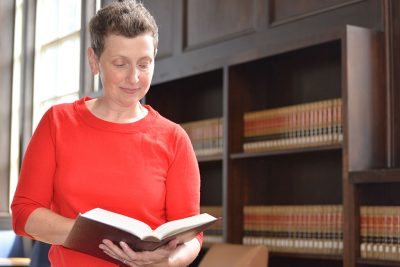Editor’s Note: Neag School alumna Jennifer Lanese ’94 (ED), ’95 MA authors this original piece, reflecting on the meaning of privilege, its impact in the classroom, and how educators can work toward fostering a culturally competent learning environment for their students. Lanese, an English teacher at Hall High School in West Hartford, Conn., was recognized as Teacher of the Year by the West Hartford Board of Education in 2015.
“If your family ever had to choose between paying for medical care or buying food, take a step backward.”
“If you have ever been catcalled, whistled at, or sexually harassed, take a step backward.”
“If your school is closed during your major religious holidays, take a step forward.”
“If you can shop in a store and never have to worry about being followed by an employee or security guard, take a step forward.”

On this bright fall morning, we stand side-by-side in a line on a field at YMCA Camp Jewell, a handful of high school teachers with almost 100 of our students. In front of us stand the dynamic and earnest youth program directors employed by the National Conference for Community and Justice (NCCJ), who are reading these statements to us and watching our reactions as we take our steps away from the starting line. At the far end of the field is “the prize”: this year, an oversized chocolate bar that makes the young people groan with excitement. After 20 minutes of moving forward and backward, falling into our memories of our life experiences thus far, some of us are within arm’s reach of the finish line and its tempting reward, while others are so far back into the edge of the woods as to be almost hidden from view.
This activity is commonly referred to as the “Privilege Walk.” Each year for the past decade, I have had the good fortune to participate alongside my students in this powerful community-building and eye-opening experience. Each year, I am reminded of my place in our society. Each year, I am impressed by the willingness of the young people around me to be honest and vulnerable in front of their peers. Each year, after our thoughtful and emotional debrief on this activity and its meaning, I am humbled, I am grateful, and I am re-energized about taking what I’ve learned back to my classroom.
As a teacher, I feel a responsibility to consider my students’ privileges — or, conversely, the ways in which they may be marginalized — and to determine ways to reconcile this with what and how we learn in our high school English classroom.
So many of life’s circumstances are influenced by what seem like flukes: the randomness of our genetics and our geography. As a white, Christian, middle-class, middle-aged, cisgendered citizen currently in good health, I have so many privileges and so many opportunities to accrue and to exercise my social power. As a woman, and more specifically as a lesbian, there are times when I feel my position on the hierarchy slip. As a teacher, I feel a responsibility to consider my students’ privileges — or, conversely, the ways in which they may be marginalized — and to determine ways to reconcile this with what and how we learn in our high school English classroom.
Recently, we have been calling this idea “cultural competence”: According to the National Education Association, this means “having an awareness of one’s own cultural identity and views about difference, and the ability to learn and build on the varying cultural and community norms of students and their families. It is the ability to understand the within-group differences that make each student unique, while celebrating the between-group variations that make our country a tapestry.”
For some teachers, this is instinct. For others, it must be learned and practiced. For me, and perhaps for many of you, it’s both. In the classroom, I almost always say “family” instead of using the words “Mom” or “Dad.” I work on quickly and consistently using a student’s preferred pronouns. I address the class as “folks” or “friends,” instead of “guys” or “kids.” I offer ways for students to bring their prior knowledge and life experiences into their writing and into their interpretations of our readings. I unabashedly steal great community-building ideas from my colleagues and try to implement them authentically. But these are broad and general practices, and my classroom does not yet reflect the truly culturally competent learning environment that I and my students long for.
Among my many other privileges, I have the privilege of being the person whose name is on a classroom door, and I proudly own all of the responsibilities and opportunities that come along with that. This year, I am recommitting myself to improving my cultural competence within the classroom, both in planning and in instruction. I recommit myself to seeing the young people in front of me for where and who they are at this point in time, and to letting that guide me. I recommit myself to my profession and to my students, both of which never cease to inspire and challenge me. Together, I know that we can all find ways to keep taking a step forward.
 Facebook
Facebook
 Twitter
Twitter
 LinkedIn
LinkedIn
